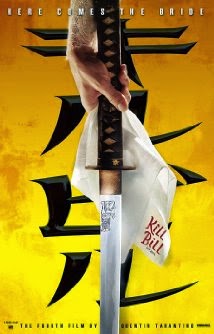When I started reading film reviews as a teenager, I learned that character development is very important. At first, I was not sure what it meant, but over the years I have come to understand it more and more. It is when the characters are given believable motivation and personality so the audience can connect with them. There was a time when I thought in order for this to happen, their backstories needed to be known. The main thing I learned from watching Quentin Tarantino movies last month is how untrue that is. We do not need to know every detail about the characters' lives.
As has been stated several times in other reviews, Tarantino develops his characters through a steady flow of dialogue. He often sets his scenes up as if it were in a play. There is a setting and there are characters talking in it. They have their own distinct personalities that are revealed through what is being said and the way the actors say it.
A great example of this is Hans Landa (Christoph Waltz) from "Inglourious Basterds." As stated in the review for it, Quentin Tarantino has said in several interviews that Landa is the greatest character he had written. I was not entirely sure why at first because there is very little that is explicitly known about him. He is not given a backstory about why he became a Nazi soldier in the first place. Everything we know about him is revealed through each scene he is in, the most notable being the opening of the film. What is interesting about him, is even though the audience is not given specific details at first, his motivation is shown near the end.
Tarantino has a way of giving just enough information for us to understand the characters and their motivations. However, what is interesting is he often does not reveal everything. For example, in "Pulp Fiction," Vincent (John Travolta) and Jules (Samuel L. Jackson) retrieve a suitcase. It is opened twice in the film, and both times the only thing the movie shows is golden light shining from the inside. The audience never knows what is inside, but it is probably very valuable.
In an interview with Charlie Rose about "Inglourious Basterds," Tarantino said he leaves certain things open for the audience's interpretation. The example from the film he was promoting was Aldo Raine's (Brad Pitt) rope burn on his neck. It is clear to see, but there is no explanation for it. Tarantino said he does this because he wants the experience to be different for everybody. The reason he imagines the rope burn came to be may be different than what I, or any other audience member, may create in our own minds, and it is therefore, a completely different movie to everyone.
There is a big detail about Tarantino films that I left out of my reviews: each pays homage to a specific genre. "Reservoir Dogs" and "Pulp Fiction" were his version of the crime genre, "Jackie Brown" is his black exploitation film, "Kill Bill" is martial arts, "Inglourious Basterds" is a war movie and "Django Unchained" is a spaghetti western. In Hollywood, Tarantino is known for being very knowledgable about cinematic history. He has seen a lot of older films, and some of the genres he tackles are not common today. Most of what I personally know about movies comes from the last 20 to 30 years, and I did not think I could do justice to a discussion on this aspect.
None of the Tarantino movies I have seen are bad by any means, but some are better than others. Here is my list from "worst" to best:
7. Django Unchained
6. Jackie Brown
5. Inglourious Basterds
4. Kill Bill: Vol. 1
3. Kill Bill Vol. 2
2. Pulp Fiction
1. Reservoir Dogs
It surprised me that "Reservoir Dogs" would make the number one spot on this list. I had seen that film about eight months ago. I remember thinking it was a good movie, but it did not seem extraordinary to me. However, watching it the second time, I realized that it is a near-perfect film. The characters are interesting, the story reveals just enough at a time to constantly keep the audience involved and the pacing is perfect. "Pulp Fiction" had been my favorite for a while -- I still love it -- but it has its slow moments whereas "Reservoir Dogs" does not.
Quentin Tarantino Month was a much more difficult task than I thought it would be, but it was also rewarding. Writing reviews about movies by the same director is a challenge because what is great about one film is often great about the others. This makes it tedious to discuss every film individually. It was rewarding because watching films by one of the greatest writer/directors of today is a learning experience. I learned a lot about how to use dialogue to create interesting characters and an enjoyable cinematic experience.
Quentin Tarantino Month:
Introduction
Kill Bill: Vol. 1
Kill Bill Vol. 2
Pulp Fiction
Django Unchained
Inglourious Basterds
Jackie Brown
Reservoir Dogs
Like my Facebook page: www.facebook.com/criticalchristopher
Follow me on Twitter: @ChrisCampbell02








No comments:
Post a Comment